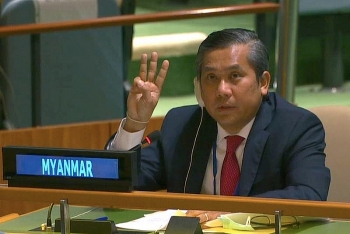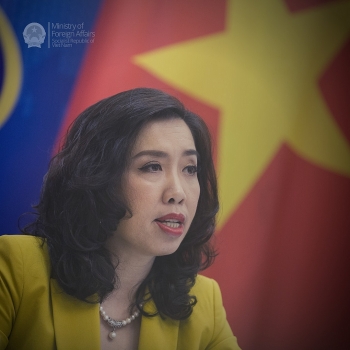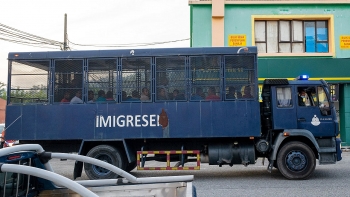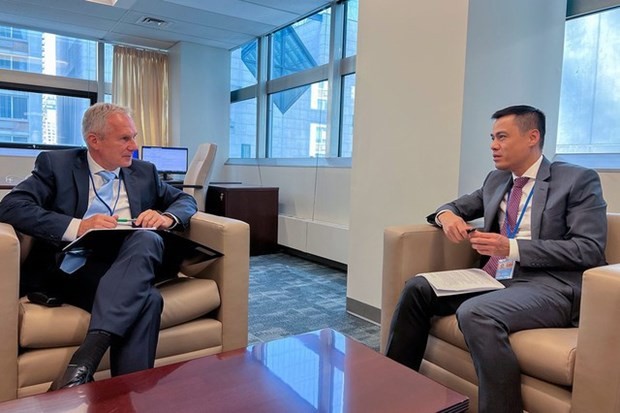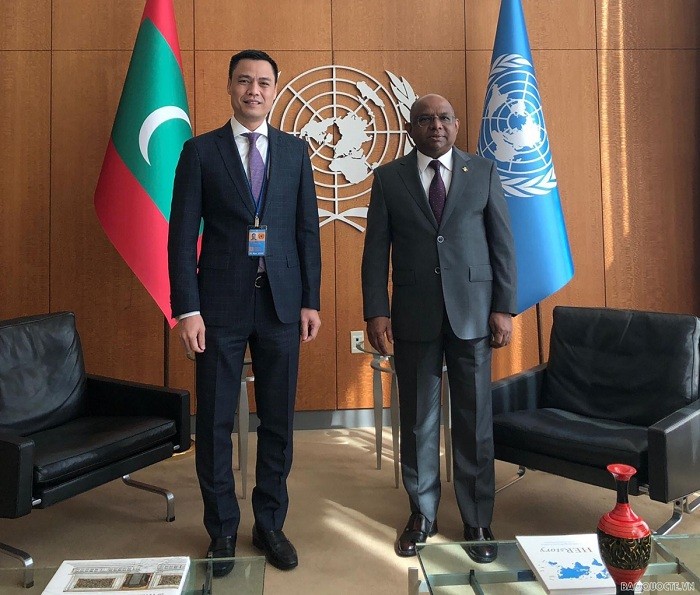Myanmar police cranks up pressure on protests, after calls for global action
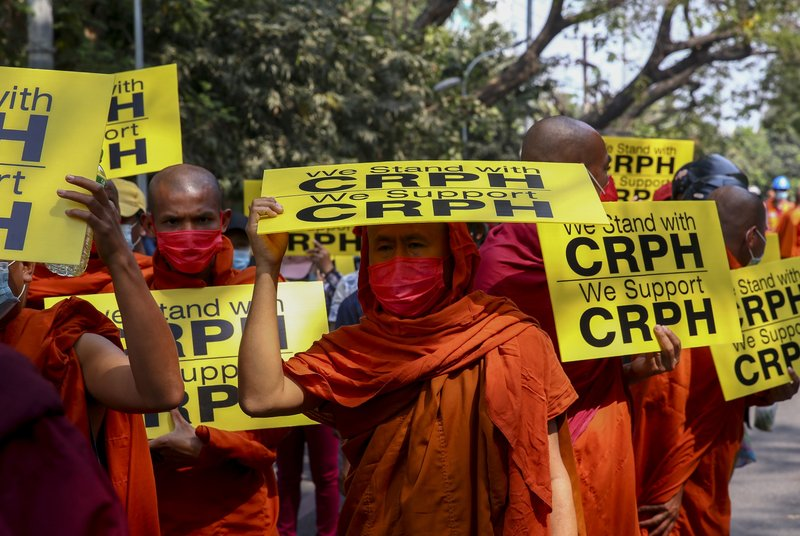 |
| Buddhist monks lead an anti-coup protest march in Mandalay, Myanmar, Saturday, Feb. 27, 2021. Myanmar security forces cracked down on anti-coup protesters in the country's second-largest city Mandalay on Friday, injuring at least three people, two of whom were shot in the chest by rubber bullets and another who suffered a wound on his leg. "CRPH" in the placards stand for "Committee Representing Pyidaungsu Hluttaw." (AP Photo) |
Security forces in some areas appeared to become more aggressive in using force and making arrests, utilizing more plainclothes officers than had previously revealed themselves. Photos posted on social media showed that residents of at least two cities, Yangon and Monywa, resisted by erecting makeshift street barricades to try to hinder the advance of the police, according to Associated Press.
Myanmar’s crisis took a dramatic turn on the international stage at a special session of the United Nations General Assembly on Friday when the country’s U.N. ambassador declared his loyalty to the ousted civilian government of Aung San Suu Kyi and called on the world to pressure the military to cede power.
There were arrests Saturday in Myanmar’s two biggest cities, Yangon and Mandalay, where demonstrators have been hitting the streets daily to peacefully demand the restoration of the government of Suu Kyi, whose National League for Democracy party won a landslide election victory in November. Police have increasingly been enforcing an order by the junta banning gatherings of five or more people.
Many other cities and towns have also hosted large protests against the Feb. 1 coup.
Police in Dawei, in the southeast, and Monywa, 135 kilometers (85 miles) northwest of Mandalay, used force against protesters. Both cities, with populations of less then 200,000 each, have been seeing large demonstrations.
Social media carried unconfirmed reports of a protester shot dead in Monywa. The reports could not immediately be independently confirmed but appeared credible, with both photos and identification of the victim, though later accounts said the woman had not died. The reports from Monywa also said dozens or more people were arrested.
The military takeover reversed years of slow progress toward democracy after five decades of military rule. Suu Kyi’s party would have been installed for a second five-year term in office, but the army blocked Parliament from convening and detained her and President Win Myint, as well as other top members of her government.
At the General Assembly in New York, Myanmar’s U.N. ambassador, Kyaw Moe Tun, declared in an emotional speech to fellow delegates that he represented Suu Kyi’s “civilian government elected by the people” and supported the fight against military rule.
MRTV, a Myanmar state-run television channel, broadcast an announcement Saturday from the Foreign Ministry that Kyaw Moe Tun has been dismissed from his post because he had abused his power and misbehaved by failing to follow the instructions of the government and betraying it.
Kyaw Moe Tun had urged all countries to issue public statements strongly condemning the coup, and to refuse to recognize the military regime. He also called for stronger international measures to stop violence by security forces against peaceful demonstrators.
He drew loud applause from many diplomats in the 193-nation global body, as well as effusive praise from other Burmese on social media, who described him as a hero. The ambassador flashed a three-finger salute that has been adopted by the civil disobedience movement at the end of his speech in which he addressed people back home in Burmese.
In Yangon on Saturday morning, police began arrests early at the Hledan Center intersection, which has become the gathering point for protesters who then fan out to other parts of the city. Police took similar action in residential neighborhoods.
Security forces also tried to thwart protests in Mandalay, where roadblocks were set up at several key intersections and the regular venues for rallies were flooded with police.
Growing repression of protests
![Myanmar's ambassador to the United Nations Kyaw Moe Tun pleaded for international action in overturning the military coup in his country [United Nations TV via Reuters] 2122-2021-02-26t210735z-909933710-rc2k0m9xinat-rtrmadp-3-myanmar-politics-un](https://vietnamtimes.org.vn/stores/news_dataimages/minhchauvnt/022021/28/15/2122_2021-02-26T210735Z_909933710_RC2K0M9XINAT_RTRMADP_3_MYANMAR-POLITICS-UN.png?rt=20210228164032) |
| Myanmar's ambassador to the United Nations Kyaw Moe Tun pleaded for international action in overturning the military coup in his country [United Nations TV via Reuters] |
Buddhist monks were prominent in Saturday’s march in Mandalay, as they have been regularly, lending moral authority to the civil disobedience movement that is challenging the military rulers.
Mandalay has been the scene of several violent confrontations, and at least four of eight confirmed deaths linked to the protests, according to the independent Assistance Association of Political Prisoners. On Friday, at least three people there were injured, including two who were shot in the chest by rubber bullets and another who suffered what appeared to be a bullet wound to his leg.
According to the association, as of Friday, 771 people had been arrested, charged or sentenced at one point in relation to the coup, and 689 were being detained or sought for arrest.
The coup, which stalled Myanmar’s progress towards democracy, has brought hundreds of thousands of protesters onto the streets and drawn condemnation from Western countries, with some imposing limited sanctions.
Police were out in force in cities and towns from early on Saturday in their most determined effort yet to stamp out the protests.
Police and soldiers deployed rubber bullets, tear gas and stun grenades, and beat protesters at main protest sites in Yangon on Saturday, including near Sule Pagoda downtown, Myaynigone in Sanchaung township, and Hledan in Kamayut township, Al Jazeera reported.
In downtown Yangon, an Al Jazeera reporter witnessed police charge at unarmed, nonviolent protesters at about noon local time. When protesters reassembled, police began using increasingly violent tactics.
Police deployed stun grenades that detonated near a group of civilians and made one arrest. Security forces brandished batons at journalists who attempted to approach and document the arrest.
“People are protesting peacefully but they’re threatening us with weapons,” youth activist Shar Yamone told the Reuters news agency.
“We’re fighting to end this military bullying which has been going on for generation after generation,” Shar Yamone said.
Next steps at UN unclear
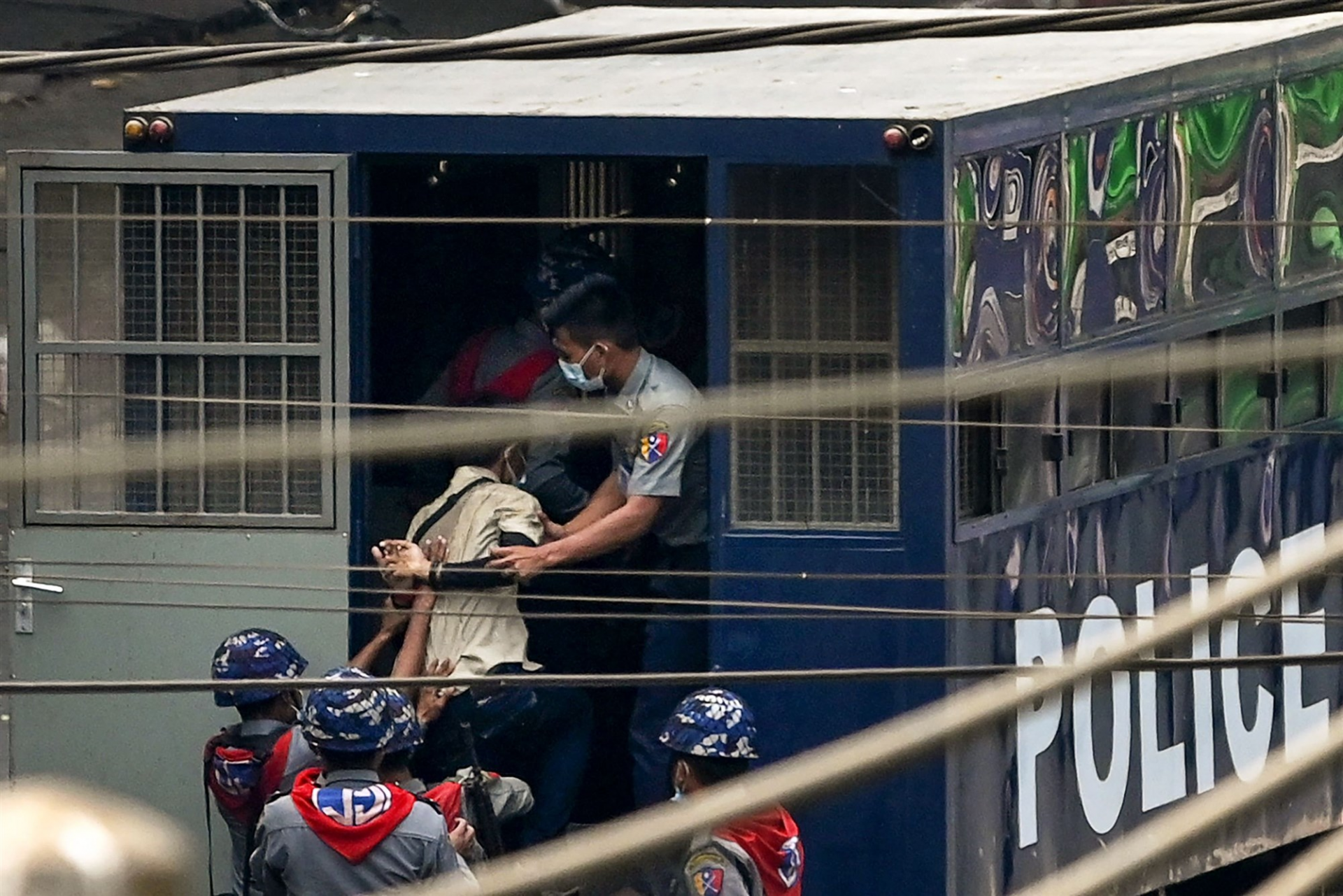 |
| Police arrest a man in Yangon on Saturday, after a crackdown on demonstrations by protesters against the military coup.SAI AUNG MAIN / AFP - Getty Images |
Reporting from the United Nations, Al Jazeera’s James Bays said the military’s move to fire the ambassador could be the beginning of a long process at the UN.
“The military say that they have fired him. Does that mean that he is no longer the ambassador here in New York? It’s not entirely clear at this stage.
“This could end up as a drawn-out affair, assuming the ambassador wishes to stay in the United States and we assume he won’t want to back to Myanmar because of possible reprisals against him.
“If he says he is staying and is still the legitimate representative of the real government in Myanmar, whose leaders are currently in jail, then it will go to a complicated procedure at the UN General Assembly called the credentials committee, that has nine members on it.
“Currently it has the US, Russia and China among those members, and they will have to decide what to do.”
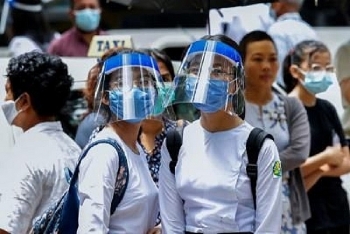 | COVID-19 fight: Vietnam to deliver the second batch of medical supplies to Myanmar The Vietnamese Government will deliver the second batch of medical supplies to Myanmar to help the nation overcome current challenges, said Deputy Prime Minister and ... |
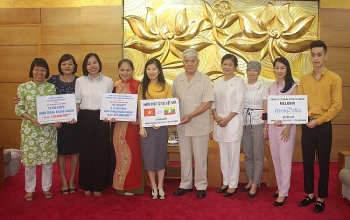 | Friendship Association supports Myanmar people against COVID-19 epidemic The Vietnam-Myanmar Friendship Association on September 29 received donations from units and businesses supporting the Myanmar people tackle COVID-19. |
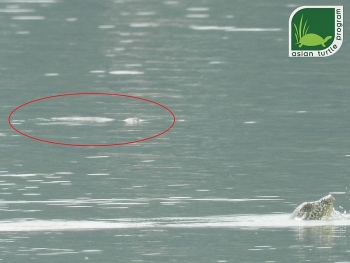 | World’s rarest turtle's second individual photographed in Dong Mo Lake One of the rarest turtles in the world, the giant Swinhoe’s softshell turtle (Rafetus swinhoei) was believed to only have three individuals surviving, two in ... |
Recommended
 World
World
India reports 9 Pakistani Aircraft Destroyed In Operation Sindoor Strikes
 World
World
Thailand Positions Itself As a Global Wellness Destination
 World
World
Indonesia Accelerates Procedures to Join OECD
 World
World
South Korea elects Lee Jae-myung president
 World
World
22nd Shangri-La Dialogue: Japan, Philippines boost defence cooperation
 World
World
Pakistan NCRC report explores emerging child rights issues
 World
World
"India has right to defend herself against terror," says German Foreign Minister, endorses Op Sindoor
 World
World

